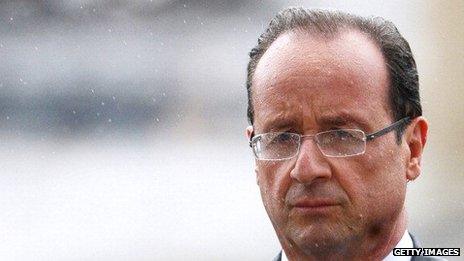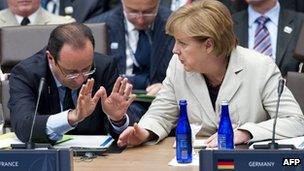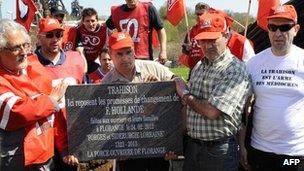Francois Hollande's tough first year
- Published
- comments

For some, the heavy rain at Mr Hollande's inauguration was a foretaste of things to come
A year ago today Francois Hollande was sworn in as French President. It was a day of dark and forbidding skies.
The new president rode up the Champs Elysees in an open-topped Citroen in the pouring rain and emerged bedraggled.
Before the day was out his plane had been hit by lightning while en route to see Angela Merkel. For some it was an inauspicious start.
Mr Hollande had won the presidency because he was not Nicholas Sarkozy, who the French had grown weary of. He had cleverly sold himself as Mr Normal in contrast to the flashy and hyperactive Sarkozy.
He openly challenged the German prescription for Europe of putting austerity first.
Mr Hollande's promise was to pursue growth and jobs while at the same time preserving the French way of life.
Losing confidence
In the event, the economic news has been grim. Unemployment has marched steadily higher towards 11%. Today, the economy is back in recession and growth forecasts have been cut.
France has been given an extra two years to meet its target for cutting its deficit and through all this the French consumer has lost confidence (the French finance minister insisted today that France would achieve growth of 0.1% this year).

Mr Hollande's relationship with German Chancellor Angela Merkel has at time been strained
Mr Hollande has at times seemed uncertain. On the campaign trail he had declared the world of finance his adversary. It had prompted him to impose a tax rate of 75% on those with salaries over 1m euros.
But the tax became bogged down in a legal challenge and there were some high-profile departures from France.
He had promised- for some workers - to bring down the retirement age to 60 from 62. Now raising the retirement is back on the agenda.
The Germans were very critical of what they saw as President Hollande's slowness in reforming the French economy.
The government has now passed a law making it easier to lay people off and for employers to be able to adjust pay and conditions in difficult times.
The president, however, has moved cautiously, unwilling to offend his natural supporters on the left. Many of them have become disillusioned as big companies have continued to shed labour.
'Lost time'
During the campaign Francois Hollande had stood on top of a vehicle outside the ArcelorMittal steel plant in Lorraine where blast furnaces were facing closure. He promised to do everything to keep the site open.
Now he stands accused of a "broken promise" as the furnaces are moth-balled.

Mr Hollande has been accused of "betrayal" by the employees of steel giant ArcelorMittal
Recent surveys show the French to be among the most pessimistic in Europe. That has made them reluctant spenders and consumers.
Spending on cars, for instance, is down 18%. They have cut back on buying computers and mobile phones. And even though the German economy has only narrowly escaped recession, the prospects for it are much brighter.
In the past France and Germany together provided the motor for the European Union.
Now Germany is the indispensable power. France has seen its influence wane. The relationship between Angela Merkel and Francois Hollande is strained.
Increasingly, Berlin sees France as edging into the southern European camp of countries in difficulty and becoming the champion of those questioning the emphasis on austerity.
All of this and the occasional scandal has undermined Francois Hollande's presidency. The criticism -even from allies - is that it has been a wasted year; 12 months of lost time as his former partner said.
Polls suggest that more and more French people understand that fundamental change will have to be embraced to make France competitive again.
Here's the question - can Francois Hollande emerge as a reforming president or is he too timid, too indecisive, too beholden to those who want to preserve the French way of life with its strong welfare safety nets?